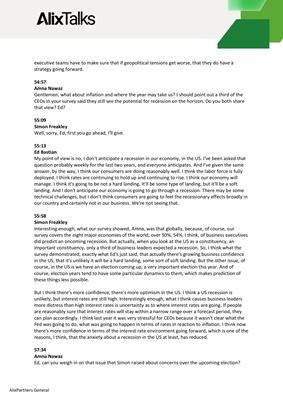
the increasing integration of AI into various industries, I'm curious about its overarching impact on
the consulting sector. Could you share insights on how AI is reshaping consulting services,
particularly in terms of operational efficiency, client service quality, and innovation in business
models, and last but not least, pricing and profits."
50:27
Simon Freakley
I think it's going to profoundly affect the consulting industry and maybe even more broadly the
professional services industry in a number of ways. I mean, first of all of course, most professional
services firms, including most consulting firms, are pyramids, and so the majority of the people that
are junior level. And that's how the business model of these consultancies work. Very hardworking
junior consultants, recording lots of hours. What's going to happen is that AI has already started to
displace much of the analysis that's done by the traditional bottom half of the pyramid. And so, most
consultancies will turn into a diamond shape rather than a pyramid. But the one thing that won't
change is the value of wisdom and judgment, which of course is what clients look for in terms of
what the analysis actually tells us, what their best strategy should be.
So, I think that the consulting industry will absolutely continue to thrive, because advice, and
judgment, and wisdom is still prized in its many different forms. How the data is aggregated into
analysis and then refined into what the available strategies are and how one advises on the
preferred strategy, and also, particularly of course AlixPartners that specializes in the
implementation of strategies I think will still be alive and well. What I do think will happen though, is
that the way in which consulting services or accounting services or legal services end up being priced
will be less about per diem rate, paying by the hour or the day, but more around the impact of the
solutions and the implementation of those solutions. So, do I think the consulting industry, the legal
industry, the accounting industry will still be necessary and thrive? Yes, I do. Do I think the way in
which the work is done, the analysis and formulation work is done, to enable the senior practitioners
to give their advice? Absolutely, it will change. So, I think there's going to be an awful lot of
transition going on in the next few years.
52:28
Amna Nawaz
Michael, there's a good question about the development of large language models for you. Here
someone writes, "Do you believe the most cutting edge LLMs will continue to increase in parameter
size and training time and resources, or will they start to level off or even decrease in size while
improving performance?"
52:46
Michael Kratsios
Well, I think we're going to actually see both. So, I think from most of the large language model
players you're seeing, they continue to want to increase the size and scale of their models. And the
next training runs that you're going to be seeing the top developers doing over the next year are
going to be increasing in size. Like, right, an extreme example is the Falcon model that was created
by the UAE - that's arguably the best or the second best performing open source model in the
world, that's an 180 billion parameter model. That being said, I think there's a real realization that a
lot of these use cases do not require these massive, massive models that can often be expensive to
run.